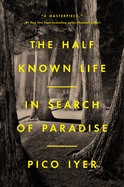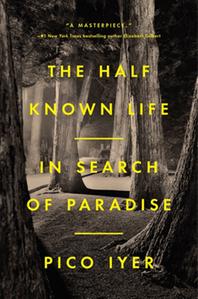
 For some 40 years, Pico Iyer has traveled the globe, introducing readers to some of the world's most exotic locales. In The Half Known Life: In Search of Paradise, he does so again, deploying his observant eye and elegant prose in search of the answer to the plaintive, provocative question, "What kind of paradise can ever be found in a world of unceasing conflict--and whether the very search for it might not simply aggravate our differences."
For some 40 years, Pico Iyer has traveled the globe, introducing readers to some of the world's most exotic locales. In The Half Known Life: In Search of Paradise, he does so again, deploying his observant eye and elegant prose in search of the answer to the plaintive, provocative question, "What kind of paradise can ever be found in a world of unceasing conflict--and whether the very search for it might not simply aggravate our differences."
Iyer (Autumn Light: Season of Fire and Farewells) begins his episodic journey through several countries in an unlikely place--Iran, "the culture that had given us both our word for paradise and some of our most soulful images of it," and a land he admits that had "dazzled me from afar since boyhood with its jeweled verses and the flat visions of paradise magicked into being on its carpets." Throughout his visit, he's dogged by the tension between the repressive regime and the efforts of ordinary Iranians to escape its restrictions and live in freedom and peace.
From there he's reporting on a stop in Belfast, Northern Ireland, on what he thinks of as a "kind of pilgrimage" to the country that produced singer-songwriter Van Morrison and the music that's provided some of the soundtrack of Iyer's life. It's also the place where Morrison had sought to "retrieve some ancient vision that had been lost." In Belfast, Iyer reveals the source of his book's title, a line from Moby-Dick about the "horrors of the half known life," but he differs from Melville, noting: "On a deeper level, however, it's everything half known, from love to faith to wonder and terror, that determines the course of our lives."
Other stops on Iyer's tour--one whose sequence and timing is not clearly defined and that encompasses some visits that occurred more than a decade ago--include a small town on the coast of Western Australia, Jerusalem (a city that contains a "riot of views of paradise," especially in and around the Church of the Holy Sepulchre) and the region of Ladakh in Kashmir.
He lingers on the island of Sri Lanka, an "earthly paradise" that's been ravaged by civil war for decades. There he experiences some of his most perilous moments on his visit to its Buddhist capital of Kandy. He concludes with a stop at Varanasi, India, a city steeped in death that "transfixed me as only a cataclysm can." With its polluted Ganges River and perpetually burning funeral pyres, the city's one attraction for him was that he was "unlikely to mistake it for paradise."
Everywhere Pico Iyer travels his keen vision allows him to see both ravishing beauty and profound flaws. He never truly discovers his metaphorical paradise, but his wide-ranging quest is a useful reminder that the journey often is more absorbing than any destination. --Harvey Freedenberg, freelance reviewer
Shelf Talker: Pico Iyer elegantly recounts some of his exotic travels and reflects on the search for an elusive land of bliss.

